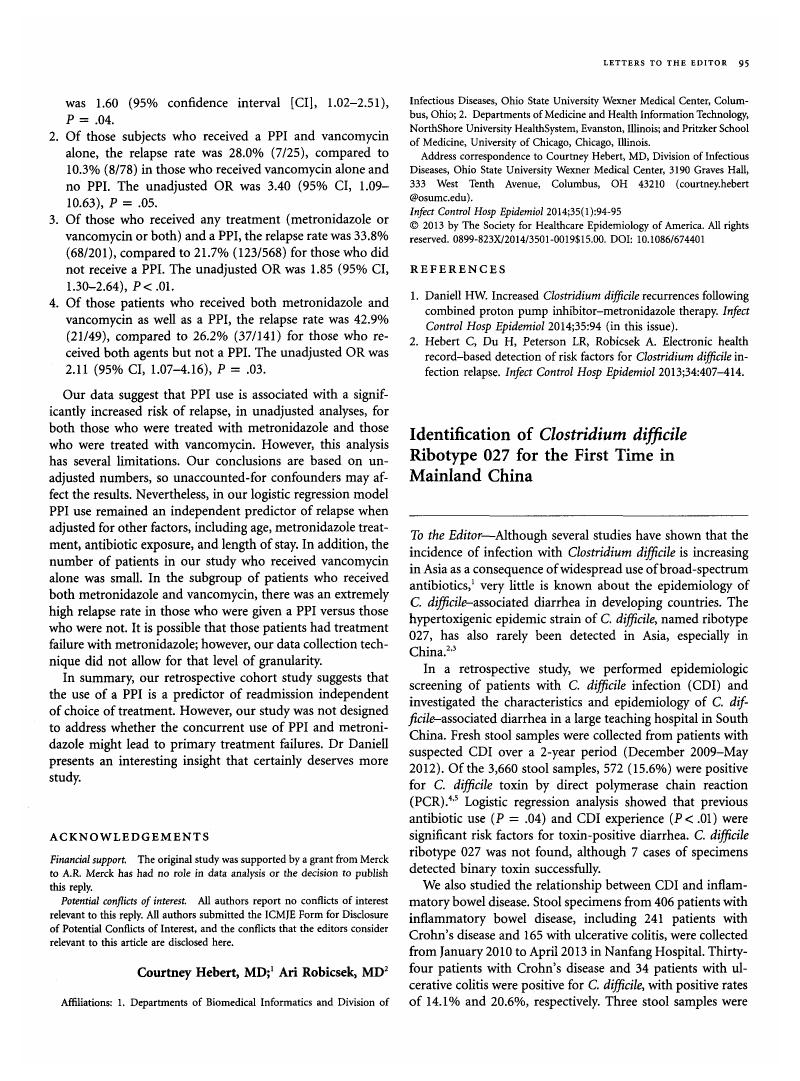Crossref Citations
This article has been cited by the following publications. This list is generated based on data provided by Crossref.
Zhou, F. F.
Wu, S.
Klena, J. D.
and
Huang, H. H.
2014.
Clinical characteristics of Clostridium difficile infection in hospitalized patients with antibiotic-associated diarrhea in a university hospital in China.
European Journal of Clinical Microbiology & Infectious Diseases,
Vol. 33,
Issue. 10,
p.
1773.
Wang, Xiaohui
Cai, Lin
Yu, Rujia
Huang, Wenzhi
Zong, Zhiyong
and
McDowell, Andrew
2014.
ICU-Onset Clostridium difficile Infection in a University Hospital in China: A Prospective Cohort Study.
PLoS ONE,
Vol. 9,
Issue. 11,
p.
e111735.
Valiente, E.
Cairns, M.D.
and
Wren, B.W.
2014.
The Clostridium difficile PCR ribotype 027 lineage: a pathogen on the move.
Clinical Microbiology and Infection,
Vol. 20,
Issue. 5,
p.
396.
Li, Chunhui
Liu, Sidi
Zhou, Pengcheng
Duan, Juping
Dou, Qingya
Zhang, Rui
Chen, Hong
Cheng, Ying
and
Wu, Anhua
2015.
Emergence of a Novel Binary Toxin–Positive Strain of Clostridium difficile Associated With Severe Diarrhea That Was Not Ribotype 027 and 078 in China.
Infection Control & Hospital Epidemiology,
Vol. 36,
Issue. 9,
p.
1112.
Hung, Yuan-Pin
Cia, Cong-Tat
Tsai, Bo-Yang
Chen, Po-Chuan
Lin, Hsiao-Ju
Liu, Hsiao-Chieh
Lee, Jen-Chieh
Wu, Yi-Hui
Tsai, Pei-Jane
and
Ko, Wen-Chien
2015.
The first case of severe Clostridium difficile ribotype 027 infection in Taiwan.
Journal of Infection,
Vol. 70,
Issue. 1,
p.
98.
Liao, Tsai-Ling
Lin, Chin-Fu
Chiou, Chien-Shun
Shen, Gwan-Han
and
Wang, John
2015.
<i>Clostridium difficile</i> PCR Ribotype 027 Emerges in Taiwan.
Japanese Journal of Infectious Diseases,
Vol. 68,
Issue. 4,
p.
338.
Putsathit, Papanin
Kiratisin, Pattarachai
Ngamwongsatit, Puriya
and
Riley, Thomas V.
2015.
Clostridium difficile infection in Thailand.
International Journal of Antimicrobial Agents,
Vol. 45,
Issue. 1,
p.
1.
Cao, Bo
Zhang, Yuanyuan
Bian, Funing
Cheng, Ying
Wang, Jing
Jia, Hongbing
Zhang, Wen
Lu, Jinxing
Chen, Chen
and
Du, Pengcheng
2015.
Detection of Clostridium difficile toxin genes by PCR: sequence variation may cause false-negative results.
Journal of Medical Microbiology
,
Vol. 64,
Issue. 2,
p.
195.
Tian, Tian-tian
Zhao, Jian-hong
Yang, Jing
Qiang, Cui-xin
Li, Zhi-rong
Chen, Jing
Xu, Kai-yue
Ciu, Qing-qing
Li, Ru-xin
and
Deshpande, Abhishek
2016.
Molecular Characterization of Clostridium difficile Isolates from Human Subjects and the Environment.
PLOS ONE,
Vol. 11,
Issue. 3,
p.
e0151964.
Cheng, Jing-Wei
Xiao, Meng
Kudinha, Timothy
Xu, Zhi-Peng
Hou, Xin
Sun, Lin-Ying
Zhang, Li
Fan, Xin
Kong, Fanrong
and
Xu, Ying-Chun
2016.
The First Two Clostridium difficile Ribotype 027/ST1 Isolates Identified in Beijing, China–an Emerging Problem or a Neglected Threat?.
Scientific Reports,
Vol. 6,
Issue. 1,
Kullin, B.
Brock, T.
Rajabally, N.
Anwar, F.
Vedantam, G.
Reid, S.
and
Abratt, V.
2016.
Characterisation of Clostridium difficile strains isolated from Groote Schuur Hospital, Cape Town, South Africa.
European Journal of Clinical Microbiology & Infectious Diseases,
Vol. 35,
Issue. 10,
p.
1709.
Wong, Sunny H.
Ip, Margaret
Hawkey, Peter M.
Lo, Norman
Hardy, Katie
Manzoor, Susan
Hui, Wyman W.M.
Choi, Kin-wing
Wong, Rity Y.K.
Yung, Irene M.H.
Cheung, Catherine S.K.
Lam, Kelvin L.Y.
Kwong, Thomas
Wu, William K.K.
Ng, Siew C.
Wu, Justin C.Y.
Sung, Joseph J.Y.
and
Lee, Nelson
2016.
High morbidity and mortality of Clostridium difficile infection and its associations with ribotype 002 in Hong Kong.
Journal of Infection,
Vol. 73,
Issue. 2,
p.
115.
Jia, Hongbing
Du, Pengcheng
Yang, Hui
Zhang, Yuanyuan
Wang, Jing
Zhang, Wen
Han, Guiling
Han, Na
Yao, Zhiyuan
Wang, Haiyin
Zhang, Jing
Wang, Zhen
Ding, Qingming
Qiang, Yujun
Barbut, Frédéric
Gao, George F.
Cao, Yongtong
Cheng, Ying
and
Chen, Chen
2016.
Nosocomial transmission of Clostridium difficile ribotype 027 in a Chinese hospital, 2012–2014, traced by whole genome sequencing.
BMC Genomics,
Vol. 17,
Issue. 1,
Zhang, Ting
Lin, Qian-Yun
Fei, Jia-Xi
Zhang, Yan
Lin, Min-Yi
Jiang, Shuang-Hong
Wang, Pu
and
Chen, Ye
2016.
Clostridium Difficile Infection Worsen Outcome of Hospitalized Patients with Inflammatory Bowel Disease.
Scientific Reports,
Vol. 6,
Issue. 1,
Kullin, B.
Wojno, J.
Abratt, V.
and
Reid, S. J.
2017.
Toxin A-negative toxin B-positive ribotype 017 Clostridium difficile is the dominant strain type in patients with diarrhoea attending tuberculosis hospitals in Cape Town, South Africa.
European Journal of Clinical Microbiology & Infectious Diseases,
Vol. 36,
Issue. 1,
p.
163.
Cheong, Elaine
Roberts, Tamalee
Rattanavong, Sayaphet
Riley, Thomas V.
Newton, Paul N.
and
Dance, David A. B.
2017.
Clostridium difficile infection in the Lao People’s Democratic Republic: first isolation and review of the literature.
BMC Infectious Diseases,
Vol. 17,
Issue. 1,
Bouza, E.
Alcalá, L.
Marín, M.
Valerio, M.
Reigadas, E.
Muñoz, P.
González-Del Vecchio, M.
and
de Egea, V.
2017.
An outbreak of Clostridium difficile PCR ribotype 027 in Spain: risk factors for recurrence and a novel treatment strategy.
European Journal of Clinical Microbiology & Infectious Diseases,
Vol. 36,
Issue. 10,
p.
1777.
Cairns, M. D.
Preston, M. D.
Hall, C. L.
Gerding, D. N.
Hawkey, P. M.
Kato, H.
Kim, H.
Kuijper, E. J.
Lawley, T. D.
Pituch, H.
Reid, S.
Kullin, B.
Riley, T. V.
Solomon, K.
Tsai, P. J.
Weese, J. S.
Stabler, R. A.
Wren, B. W.
and
Carroll, Karen C.
2017.
Comparative Genome Analysis and Global Phylogeny of the Toxin Variant Clostridium difficile PCR Ribotype 017 Reveals the Evolution of Two Independent Sublineages.
Journal of Clinical Microbiology,
Vol. 55,
Issue. 3,
p.
865.
Cheng, Jing-Wei
Liu, Chang
Kudinha, Timothy
Xiao, Meng
Yu, Shu-Ying
Yang, Chun-Xia
Wei, Ming
Liang, Guo-Wei
Shao, Dong-Hua
Kong, Fanrong
Tong, Zhao-Hui
and
Xu, Ying-Chun
2018.
Use of matrix-assisted laser desorption ionization–time of flight mass spectrometry to identify MLST clade 4 Clostridium difficile isolates.
Diagnostic Microbiology and Infectious Disease,
Vol. 92,
Issue. 1,
p.
19.
Gu, Huawei
Shi, Kan
Liao, Zhengping
Qi, Haonan
Chen, Shuyi
Wang, Haiying
Li, Shan
Ma, Yi
and
Wang, Jufang
2018.
Time-resolved transcriptome analysis of Clostridium difficile R20291 response to cysteine.
Microbiological Research,
Vol. 215,
Issue. ,
p.
114.





